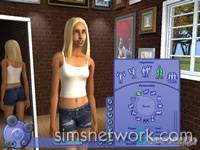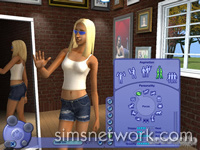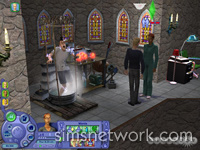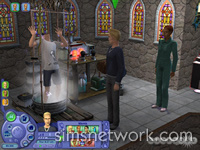Designer Diary #8
"Without a doubt, The Sims 2 will be one of the biggest gaming events of the year when it is released in September. The sequel to one of the most successful games of all time, The Sims 2 is more than just a graphical upgrade of the original game."
The Sims 2 Designer Diary #8
Producer Jonathan Knight tells us about the game's new aspiration system, which makes your sims act more like real people.
This sim has wealth aspirations, but he's going about it the hard way. Double-click on the video window for a full-screen view.
Without a doubt, The Sims 2 will be one of the biggest gaming events of the year when it is released in September. The sequel to one of the most successful games of all time, The Sims 2 is more than just a graphical upgrade of the original game. In addition to a gorgeous 3D graphics engine, Maxis is introducing entirely new features and capabilities into the game, including the ability to oversee multiple generations of a single sim family. While the designers have been improving the gameplay, they've also been careful to maintain the fun and simplicity of the original game. And as producer Jonathan Knight explains in the latest edition of our designer diaries, Maxis is going to introduce a new behavioral system that will allow your sims to act more lifelike than ever before. Now your sims will want more out of life, and it'll be up to you to either give it to them or not.
Wants & Fears
By Jonathan Knight
Producer
You might not think that potty training the sims sounds like a real job, but in a strange way, that's exactly what our team has been up to for the last several months as we put the finishing touches on the new gameplay innovation in The Sims 2. With a new interface, a new simulator, and the same old Maxis humor, we've had a blast taking "that people game" to the next level. Here's a sneak peek into how we arrived at our revolutionary new game design.
 It's been four years since bladder failure was all the rage. In the original The Sims, your sims had eight basic needs--bladder, hygiene, social, etc.--and your job as the player was to take care of these needs by clicking on toilets, showers, and other sims. Now, in The Sims 2, your sims have dreams--romance, family, knowledge, fortune, or popularity--which you, as the player, help them achieve over the course of their lifetimes. You choose the aspirational goals for your sims when you create them, and as you play, they reveal their wants and their fears. Satisfy their wants to help them lead happy, long, and successful lives. On the flip side, indulge in their fears to find out what stress can do to sims.
It's been four years since bladder failure was all the rage. In the original The Sims, your sims had eight basic needs--bladder, hygiene, social, etc.--and your job as the player was to take care of these needs by clicking on toilets, showers, and other sims. Now, in The Sims 2, your sims have dreams--romance, family, knowledge, fortune, or popularity--which you, as the player, help them achieve over the course of their lifetimes. You choose the aspirational goals for your sims when you create them, and as you play, they reveal their wants and their fears. Satisfy their wants to help them lead happy, long, and successful lives. On the flip side, indulge in their fears to find out what stress can do to sims.
Great concept, right? But what does an aspiration look like in the game? Arguably, the most important thing any game can do is communicate the user interface in a clear, concise, and compelling manner. The original interface for The Sims did all of these things (you saw the word "needs" plus eight red/green bars, each with a word next to it, be it "hunger," "bladder," etc.). The Sims 2 interface needed to boil down the concept of lifetime aspirations, as well as retain the inherent Will Wright humor of the original "needs" panel. (There's just something funny about seeing the word "bladder" with a red/green bar next to it!) So our designers put together a mock-up that showed the words "wants" and "fears" with a series of colorful icons beneath each word. As a team, we fell in love with the new game panel. The challenge then became to deliver this feature within the parameters of this simplistic new design.
We needed a visualization of everything a sim could possibly want or fear. "How are we going to draw a picture of a near-death experience? How do we make 'I want to flirt with Sarah.' into an icon?" We had moved beyond the hundred-or-so memory images. We now needed to iconify--i.e., represent with little images in the wants and fears panel--everything a sim could possibly want or fear in a lifetime. This meant developing a visual language for anything that could happen in the game. And The Sims 2 is a big game! So we came up with a two-icon "grammar" for each want or fear, where the primary icon (say, two wedding rings) does most of the work, and a secondary icon serves as a "modifier," if needed. For example, if a sim wants to "get married," we just use the wedding rings. If a sim wants to "marry Sarah," we use a primary icon of Sarah's face with a secondary icon of wedding rings.
Sims Just Want to Have Fun
With the help of some extremely talented and detail-oriented artists, we were able to come up with a language of icons that allowed us to express, literally, thousands of wants and fears. My personal favorite is the icon for "woohoo"--that thing sims do when they play around underneath the covers and end up with a baby a few days later. (Wouldn't you like to know how many meetings and revisions it took to reach consensus on what that icon should look like...)
We also wanted to bring fun and dynamism to the aspiration game. We wanted players to be captivated by the mutating wants and fears of their sims. We brought some light-hearted slot-machine animation to the panel--coupled with classic sound and movement--around the achievement of a want or fear. Then we layered on interactivity so that clicking on your wants and fears became a strategic game in itself. (At any time, you can lock a want or fear, ensuring that it will always stay in the panel. This lets players strategize toward long-term wants they don't want to miss.)
Finally, the most important challenge was programming what actually shows up in this wants and fears panel. From the thousands of choices, how does the game know what a sim wants or fears at any given moment in life? To answer this question, we had to write a new simulator. And this is where the most exciting work on The Sims 2 has taken place. Here's how it basically works:
Above all else, a sim's wants or fears are consistent with the aspiration chosen for that sim. A family sim should want family things, like getting married, having babies, and teaching children. A fortune sim should want bonuses, promotions, and new electronics. A knowledge sim should want to build skills, see ghosts, meet aliens, and so forth. To keep things interesting, aspirations should eventually lead to extreme wants, like "Make out with 20 different sims." for a teen romance sim or "Have 15 kids." for the adult family sim. A big part of the game is figuring out how to pull off some of these seemingly impossible wants.
At the same time, we wanted each sim to feel unique. Each sim should want things outside of the normal aspirations--things that make them feel human and unpredictable. Some sims just want pizza! Furthermore, we knew that sims should want things based upon how you play them. If you tell your sim to flirt with Sarah, then your sim should subsequently want to kiss Sarah, and not just anyone. (Unless he's a romance sim, that is.)
And with all of that, we ultimately had to figure out why wants and fears matter? Well, they matter because every want achieved by a sim contributes to an aspiration score, which is the new red/green bar next to the wants and fears. And fears (or even failure to achieve wants) make that bar go down. When the score is in the red, sims worry a lot, become desperate, and eventually have nervous breakdowns. When the bar is in the green, sims are rewarded with new behavior and are treated differently by other sims. They also get access to a brand-new reward catalog that offers extreme objects--like the Elixir of Life, the Energizer, and the Money Tree--which make it easier for your sim to succeed. These rewards and failures are the cornerstone of the new gameplay, and they help set The Sims 2 apart from its predecessor. Strategically use these rewards, because they can backfire.
As we head down the homestretch of development on The Sims 2, it is clear that the new simulator, the new user interface, and the new rewards and failures all represent tremendous innovations over the original game while staying utterly true to Will Wright's vision. His vision was of a software toy that reduces human beings down to a few manageable concepts while maintaining a consistent sense of humor. It is fun and magical to anticipate what your sims want next, and it is extremely satisfying doing your best to give them what they want so that they live long, happy, and fulfilled lives. We hope you feel the same way when you play The Sims 2!



